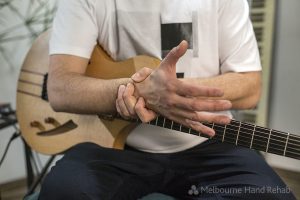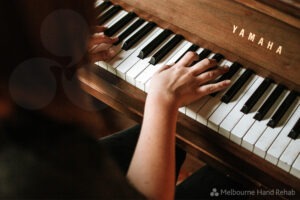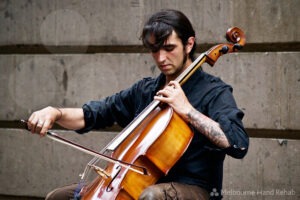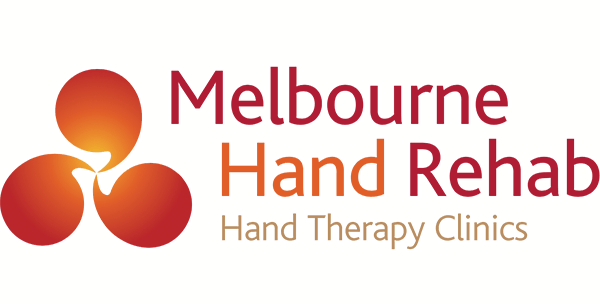
06 Dec What every musician ought to know about hand, wrist and elbow injuries
As hand therapists, we see a lot of musicians with painful hand, wrist and elbow injuries. Most are keen to get back to their music as soon as possible. Some are worried about the impact that their injury will have on their ability to play music. Most of them ask the following questions.
How much soreness is normal?
If you’re sore for longer than a few hours, you’re overdoing it.
You can overdo it by playing for too long or too hard. You may be in a slightly incorrect position or posture. Or, you may be using a slightly incorrect instrument or set up. This will put extra strain on parts of your body.
It’s best to be free from post playing soreness before your next bout of playing. If you’re regularly sore, recalculate the amount of time you play. Most importantly, if you are regularly working to the limit, be very careful not to increase suddenly.
If you’re always a bit sore, it will pay to have your posture or ergonomics looked at. Most instruments were not designed with the human body in mind and require ridiculous levels of acrobatics to get around. Good ergonomics and posture will reduce unnecessary difficulty and may leave you pain free for a majority of the time. This is ideal.

Is it tendonitis?
Tendonopathy is a painful thickening of the tendons. This is often due to swelling or overuse of the tendons in the elbow, wrists and hands of musicians. It presents much like general playing soreness, but with increased severity. Tendonopathy is easily diagnosed in the clinic. Treatment often includes a short break or relative rest (such as the use of a night splint), stretches, and exercises. A gradual re-loading and strengthening program can then begin.
You can successfully avoid ever having tendonitis by keeping it consistent. Tendons hate a change in load. It is easy to avoid tendon problems by gradually increasing the load after a break such as a holiday. Don’t try to start back up where you left off after a long break. Also, increase your work load slowly. If you have a demanding new repertoire, try practicing it in shorter sessions.
Can I play my concert?
We normally don’t make this decision for you. We can user hand therapy knowledge to tell you if playing a specific event will or will not make you worse. Understanding the impact of playing that specific concert or that exam is something you can decide. You need to know it it will make the overall recovery longer. You must take into account what’s coming up after the concert, what else is happening in your life at the time.

Is there anything I can do to prevent this from happening again? Okay, people rarely ask this question, but, we’re going to answer it anyway…
Not many musicians have their own physiotherapist or trainer. You are your own advocate and you need to think about the load and practice requirements when accepting a gig. If it’s a new or difficult repertoire, schedule enough time to practice in the lead up. It’s always a good idea to consider all other loads that may be unavoidable. For example; carrying your instrument, packing/unpacking when travelling to play, other job requirements and personal life activities.
Regardless of your level, a sudden increase in workload is an almost certain way to give yourself an injury. It is usually in the lead up to exams or a performance commitment when this happens.

Good physical shape is paramount for musicians.
Keeping fit is increasingly becoming the norm for creative musicians. There is a large physical component to being and elite musician. Staying on top of your game includes paying attending to your physical fitness.
Yoga, pilates, swimming, walking and running are all great choices. Physical exertion has also been proven to alleviate performance anxiety and other stressors related to working in your industry.
We are always here to help you with the proper ergonomics, positioning, stretching, instrument hand/wrist positioning, and fitness to avoid injury. Prevention is the best medicine.
If you are experiencing thumb, hand or wrist pain, don’t hesitate to get in touch. We’d love to help you.
BOOK AN APPOINTMENT
For more information, call us directly on 03 9458 5166


